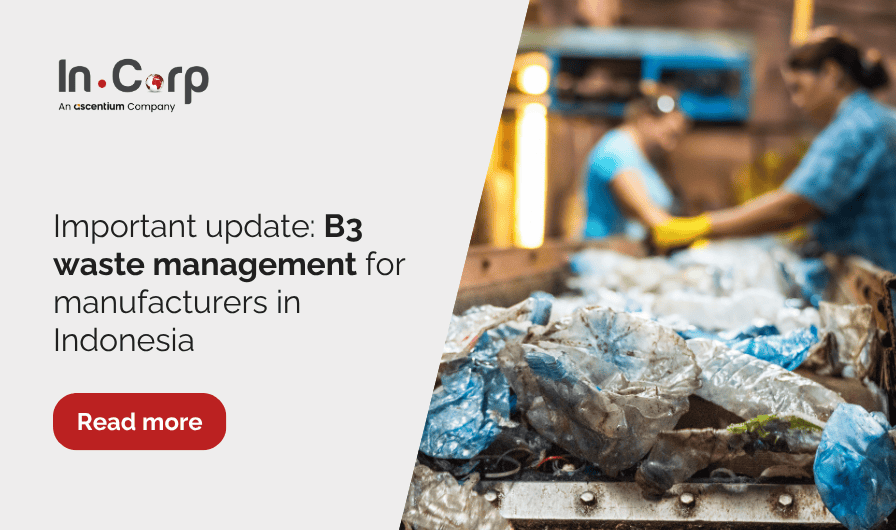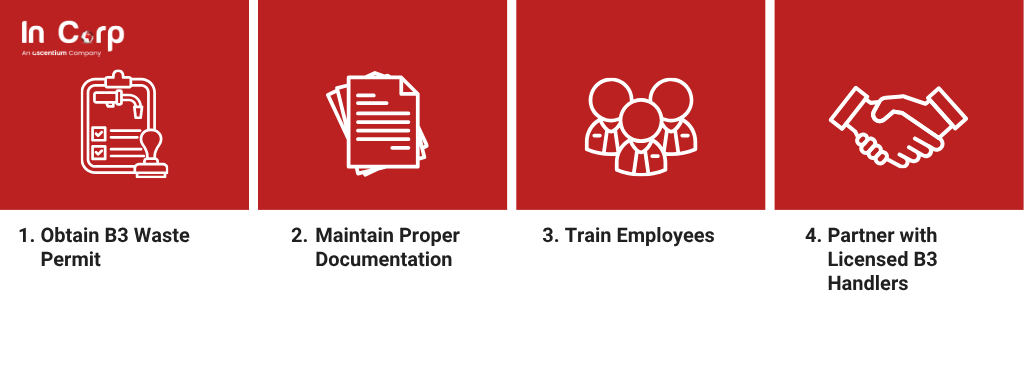Indonesia has updated its B3 waste management regulation to strengthen environmental protection and industrial compliance. For manufacturers, this means stricter permit requirements, more precise waste classification, and harsher penalties for non-compliance. Staying updated is key to avoiding risks and keeping your business sustainable.
What is the newest B3 waste regulation update?
Indonesia’s government has updated its B3 waste management policy under MoEF Regulation No. 9 of 2024. This regulation strengthens how industries handle, classify, and report hazardous (B3) waste to ensure safer environmental practices. Key updates include:
- Source reduction using safer materials and efficient production processes.
- Clearer classification for B3 and non-B3 waste categories.
- Digital waste reporting through a government system for better monitoring.
- Updated B3 waste management permit system that covers storage, processing, and disposal.
- Tighter sanctions (fines, license suspension, or legal action) for non-compliance under environmental law.
Read more: The importance of the B3 waste permit in Indonesia
New classifications of B3 waste and materials
Indonesia’s updated regulation introduces clearer B3 waste classifications to help businesses manage waste safely. Understanding these categories is key to proper handling and permit approval.
Based On Characteristics
B3 waste is divided into types such as:
- Toxic waste: Contains substances harmful to health and the environment.
- Reactive waste: Can cause chemical reactions or explosions when mixed.
- Corrosive waste: Can damage materials or skin due to acidity or alkalinity.
- Infectious waste: Contains pathogens or biological hazards.
Based On Source
There are two primary sources of B3 waste:
- Specific sources (Limbah B3): Waste from particular industries (e.g., oil, chemical, or mining).
- Non-specific sources (Sampah B3): Waste generated from general industrial activities.
Non-B3 Waste
Not all industrial waste is classified as hazardous. Non-B3 waste still requires management to prevent pollution but follows lighter regulatory requirements.
Updates on B3 waste reduction and handling
Indonesia’s latest B3 waste management policy also focuses on waste reduction, handling, and sorting. Manufacturers must take proactive steps to reduce hazardous waste and ensure safe disposal.
Here is what is new under the 2025 update:
1. Waste Reduction
Companies must plan and document strategies to minimize B3 waste generation. Examples include:
- Using cleaner production technologies
- Recycling or reusing materials where possible
- Substituting hazardous substances with safer alternatives
2. Proper Waste Handling
Manufacturers must safely handle, store, and transport B3 waste using approved containers and facilities. All activities should be recorded and reported digitally to the Ministry of Environment and Forestry (KLHK).
3. Sorting and Processing
Before disposal, B3 waste should be sorted by type and hazard level. Approved B3 waste processing methods include:
- Physical or chemical treatment
- Thermal treatment (incineration)
- Secure landfill disposal
Compliance checklist for manufacturers
Every manufacturer must comply with Indonesia’s B3 waste management regulations. These rules are not just guidelines; they are crucial to ensure industrial activities remain environmentally responsible and legally safe.
1. Obtain a B3 Waste Permit
All businesses that generate, store, transport, or process B3 waste must have a valid B3 Waste Management Permit (Izin Pengelolaan Limbah B3).
This permit ensures your company meets the government’s safety, storage, and disposal standards.
2. Maintain Proper Documentation
Accurate documentation is critical under the new B3 waste policy. Manufacturers must:
- Record all B3 waste data, including waste types, quantities, sources, and hazard classifications.
- Track each stage from storage, transportation, to final disposal.
- Submit regular reports to KLHK through the electronic reporting system (SIMPEL).
- Keep audit-ready records for at least 5 years to prove compliance during inspections.
Missing or incorrect documentation can lead to administrative sanctions, including permit suspension.
3. Train Employees
It is essential to ensure that all staff involved in waste handling are well-trained in B3 waste classification, safety procedures, and emergency response protocols. This will help to ensure that waste is handled in a safe and responsible manner.
4. Partner with Licensed B3 Waste Handlers
Work only with certified B3 waste processing companies to ensure legal compliance and environmental safety.
Read more: Why Izin Air Bawah Tanah (ABT) matters to your business
Impact of non-compliance on businesses
Ignoring B3 waste management rules can cost companies a lot. Businesses may face fines, permit suspension, or shutdowns, which can cause further pollution and health risks and lead to criminal charges. In addition, it will damage your company’s reputation and investor confidence. The consequences are not just financial; they can have a lasting impact on your business.
To avoid this, always keep valid B3 waste permits, maintain clear records, and work only with licensed waste handlers. Staying compliant keeps your business safe, sustainable, and respected.
Trust your sustainable operations with InCorp
Managing B3 waste can be complex, but you do not have to do it alone. If your company handles B3 waste, getting the proper permit is essential to operate legally.
InCorp Indonesia (an Ascentium Company) provides a tailored B3 waste management permit service. We assist at every step to ensure full compliance and clean operations for manufacturers.
Contact us today and stay sustainable with the proper assistance from our experts.
Frequently Asked Questions
What are the key updates in the 2024 B3 waste regulation?
Companies must now implement waste reduction plans, properly handle and store B3 waste, and sort/process waste using approved treatment methods before disposal.
Do business need a permit to manage B3 waste?
Yes. Any company that generates, stores, transports, or processes B3 waste must have a valid B3 Waste Management Permit to operate legally.
What permits and documentation are needed for B3 waste management?
Companies must have a valid B3 Waste Management Permit (Izin Pengelolaan Limbah B3) and keep accurate digital records and reports for at least five years.
What happens if a company fails to comply with the new regulation?
Non-compliance can lead to fines, permit suspension, or legal action, damaging the company’s reputation and risking operational shutdowns.
How InCorp can help with compliance?
InCorp can ensure full compliance to B3 waste regulations in Indonesia by providing an end-to-end B3 waste permit service
Get in touch with us.
What you'll get
A prompt response to your inquiry
Knowledge for doing business from local experts
Ongoing support for your business
Disclaimer
The information is provided by PT. Cekindo Business International (“InCorp Indonesia/ we”) for general purpose only and we make no representations or warranties of any kind.
We do not act as an authorized government or non-government provider for official documents and services, which is issued by the Government of the Republic of Indonesia or its appointed officials. We do not promote any official government document or services of the Government of the Republic of Indonesia, including but not limited to, business identifiers, health and welfare assistance programs and benefits, unclaimed tax rebate, electronic travel visa and authorization, passports in this website.




